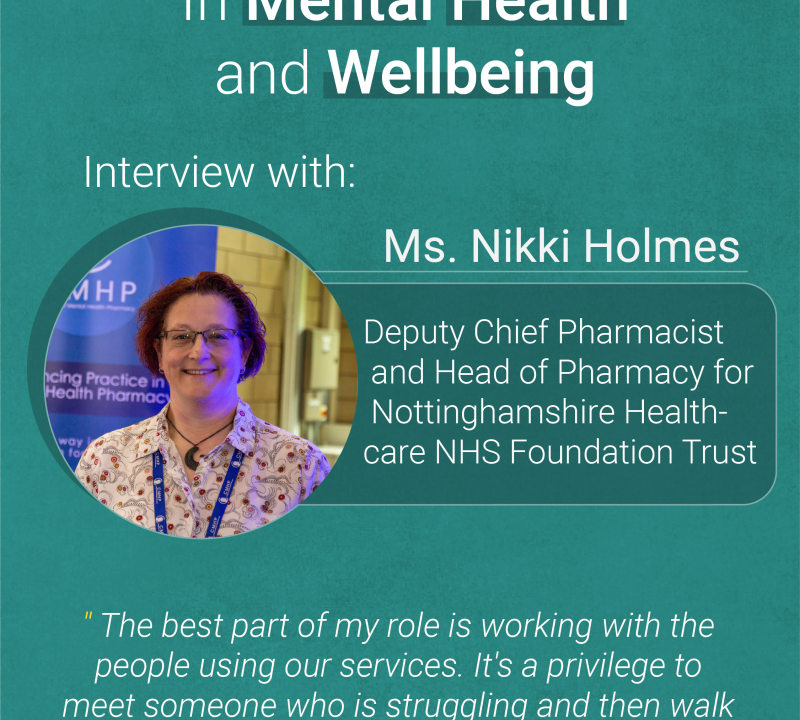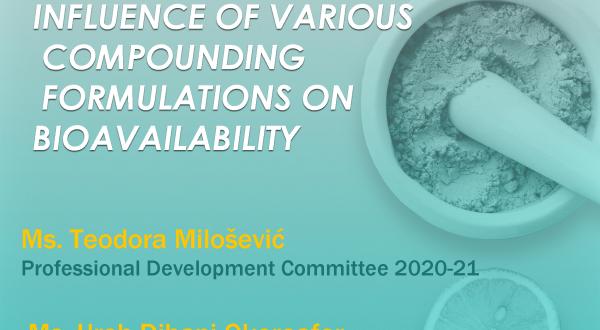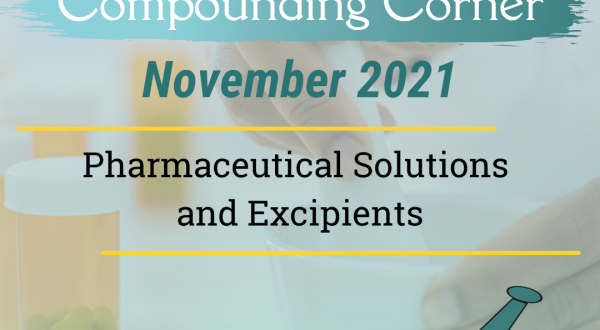
The role of pharmacists in mental health and wellbeing: stigma, COVID-19, and beyond
The role of pharmacists in mental health and wellbeing: stigma, COVID-19, and beyond
Interview with Ms. Nikki Holmes, deputy chief pharmacist and head of pharmacy for Nottinghamshire Healthcare NHS foundation trust.
By Yeryeong Choi, Public Health Committee member 2021-22
Read time: 10 minutes
'' The best part of my role is working with the people using our services. It's a privilege to meet someone who is struggling and then walk alongside them as they recover and move on.''
Privilege is the word that she has chosen to describe her joy of helping patients with mental health illness. And the passion that lies beneath her words of wisdom is what she is about to share in this interview.
There is no health without mental health: this is the WHO definition of a Sound Health. In order to maintain a good health and overall wellbeing, it is key to listen to our Mental Health needs. This need include but not limited to rest, help, and treatment. As well as the need to stop paying attention to the external voices that break pain into silence. The COVID-19 pandemic has made it clear: mental health is an urgent priority. The world needs to understand that if we were to build a mental health system on solid ground, stigma has to be broken, and everyone should be an actor of change.
As healthcare providers, pharmacists have higher responsibilities towards advancing mental health care and we play key roles in medicine by recognizing symptoms, reviewing pharmacological treatments, monitoring the effects, and collaborating with other healthcare workers to support patients with mental health disorders.
One of the career paths in mental health is psychiatric pharmacy, also known as mental health pharmacy. Ms. Nikki Holmes is the deputy chief pharmacist and the head of pharmacy for Nottinghamshire Healthcare NHS Foundation Trust. She provides specialised clinical pharmacy care in various settings, ranging from community to acute care, including in secure settings. Here Ms. Nikki Holmes talks about her experience as a Psychiatric Pharmacist, the working environment of the COVID-19 pandemic, as well as the challenges in coping with mental health stigma.
1. Tell us a little about yourself and your passion for mental health care. What has pushed you to get into this field?
I registered as a pharmacist in 1993 and started my career as a rotational pharmacist. At that time, inpatient mental health services were integrated with other inpatient healthcare services, so I was lucky enough to rotate through mental health as a routine part of my pre-registration year and then afterwards, in the same way as I did with general medicine, surgery, aeseptics, paediatrics etc. This gave me a good general background plus also gave me a chance to experience the elements of working in mental health that ultimately inspired me to go in that direction. I found the recovery-based approach of mental health services holistic and person-centred hence a non-hierarchical team way of working was evident to me. And although medicines were a vital part of treatment, they weren't the only treatment modality used. Talking therapies were sometimes more important. Nevertheless I felt that I needed a good general grounding before specialising, so I was a rotational pharmacist for the first few years of my career and completed my general clinical postgraduate diploma, prior to moving into working in mental health specifically.
2. From your perspective, what is the best part of being a Psychiatric Pharmacist and what do Pharmacists bring to mental care?
The best part of my role is working with the people using our services. It's a privilege to meet someone who is struggling and then walk alongside them as they recover and move on. Pharmacy and medicines may be only one part of an overall picture, but it's a vital one. We help the team and person find the right medicine for them and also advise on when medicines are not useful, and when and how medicines should be de-prescribed; often overlooked I find. We weave our knowledge of the medicines into a larger picture of what the person using services wants and what the other team members observe into the best possible medicines strategy for that person at that time.
3. The COVID-19 stress has affected our work and lives. Do you think there's a mental health crisis looming within the healthcare system, and what can be done to help our healthcare providers?
I think the healthcare system as a whole will have multiple challenges looming that will have an impact on mental health, both directly and indirectly. We know the pandemic is having direct effects on mental health. But it is also doing so indirectly due to all healthcare services being affected, thereby delaying diagnoses and treatments. The effect of the pandemic on healthcare staff shouldn't be underestimated. Again there are the direct effects on us of being on the front line during the pandemic, but we're also now in a position where services have been struggling to a greater or lesser extent to provide usual care.
As a society we need to preserve our healthcare services for when they're needed by taking good care of ourselves generally. We need our governments and policy makers to make good decisions and give good guidance. We need to act on good data and facilitate informed decision-making. And we need to be kind to ourselves and to others. Everyone is tired right now.
4. The less stigma, the more people will seek help and get the treatment that they need. Nevertheless, we are not quite there yet. What has been your experience regarding the impact of the stigma on mental health diagnosis and treatment? And what can we do differently to stop those labels?
While my experience suggests things have changed, things have definitely got a way to go! I'm not sure that separating out mental health trusts from acute trusts has necessarily helped in this respect, although it has had advantages too. I have friends and family members unwilling or reluctant to seek help and treatment for illnesses that I've spent a lot of time supporting to eventually do so. I've worked in different countries and with different people with very different cultural paradigms regarding mental illness, or find being labelled as a lawbreaker is preferable to having a mental health diagnosis. I've had to have some conversations throughout my career with colleagues who feel mental illness is just something you can snap out of, or who dismiss someone as being less deserving of their care because they find their behaviours distressing or puzzling.
It's really tricky introducing a conversation regarding treatment with medicines with someone who doesn't have a cultural concept of depression. The internet is both a blessing and a curse. There's an immense amount of information to sift through and many folks are passionate about mental health. For me the best mantra to adopt is "the standard you walk past is the standard you accept" Stigma needs challenge wherever it occurs, and every health professional has a responsibility to do that. Many folks feel that's just for mental health professionals to do. But actually, the majority of mental illness is treated outside of specialist settings. So as such, it's something all health professionals need to get alongside.
5. What piece of advice would you give to future pharmacists on how they can contribute to tackling the stigma, and advancing mental care?
Be aware of stigma and call it out professionally and with compassion. Know about Mental Health Conditions and how they are treated. Mental illness is common and you will come across it wherever you work. Don't be the person who won't ask someone with a mental illness how they are, or be scared to approach them because you're scared of what they might do, and that includes patients, friends and family. Treat them as you would do anyone else. Hold onto hope.
Hold onto hope, during these difficult times so we can embrace the glowing future, all together. Our hope is for this article to inspire many young pharmacists and pharmacy students around the globe.
Remember, no matter where your career will lead you, take your compassion with you. ‘’Mental illness is common and you will come across it wherever you work’’.



